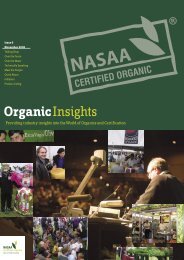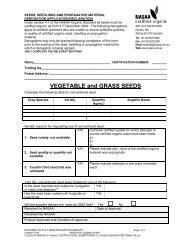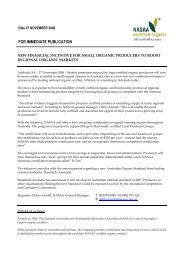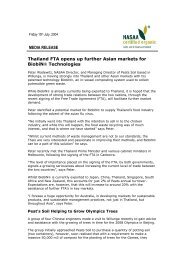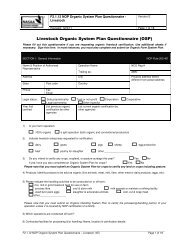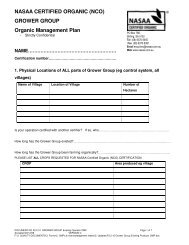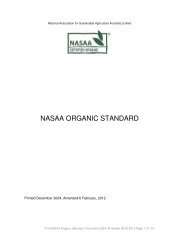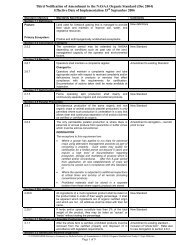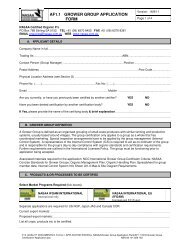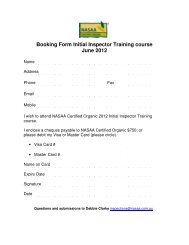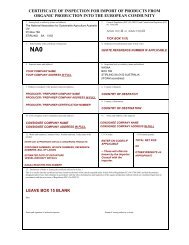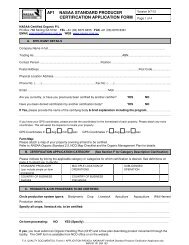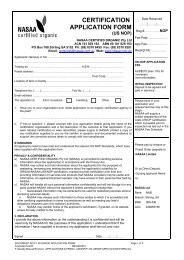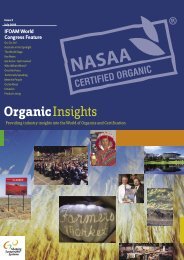IS 7.2 Info Sheet Guidelines for Exporters - NASAA
IS 7.2 Info Sheet Guidelines for Exporters - NASAA
IS 7.2 Info Sheet Guidelines for Exporters - NASAA
You also want an ePaper? Increase the reach of your titles
YUMPU automatically turns print PDFs into web optimized ePapers that Google loves.
Organic Export Certificates <strong>Guidelines</strong><br />
INTRODUCTION<br />
In order to provide a consistent and accurate export service we ask that all exporters, whether based in Australia or<br />
overseas, become familiar with the particular requirements applying to organic export. NCO will assist you to avoid<br />
delays. NCO is an Approved Certifying Organisation <strong>for</strong> the purpose of providing export certification <strong>for</strong> organic and<br />
biodynamic produce. This provides assurance to the importing country that the product has been produced in<br />
accordance with the requirements of export legislation. Required export documentation varies substantially<br />
depending on whether the goods are produced in or outside Australia. Note that conditions relating to documentation<br />
<strong>for</strong> exports may change without notice. <strong>Exporters</strong>/operators should check importing 1 country requirements <strong>for</strong> organic<br />
as well as regulatory, product labelling laws well in advance of exporting certified organic product.<br />
<strong>NASAA</strong> Certified Organic Pty Ltd (NCO) is accredited to the following programs:<br />
Department of Agriculture Australia (DOA)<br />
International Federation of Agricultural Movements (IFOAM)<br />
United States Department Agriculture National Organic Program (USDA-NOP)<br />
European Union (EU)<br />
Japanese Accreditation Service (JAS)<br />
A. GOODS PRODUCED IN AUSTRALIA<br />
DOA require all exports of organic product from Australia to be certified by a DOA approved certifier – this is under<br />
the Export Control (Organic Produce Certification) Orders 1997. A DOA Organic Produce Certificate (OPC) is<br />
required <strong>for</strong> all 2 exports out of Australia if the words “organic”, ”biodynamic” or similar appear on the accompanying<br />
paperwork, irrespective of whether the importing country requires an ‘organic export certificate’ or not. Export of<br />
certified organic product is prohibited unless a compliant OPC has been issued <strong>for</strong> the product.<br />
Certified organic product must:<br />
1. either be “Product of Australia” (a product which has been produced with ingredients all of Australian origin)<br />
or be “Made in Australia” (a product made from local and/or imported ingredients that has been significantly<br />
trans<strong>for</strong>med in the production process in Australia); and<br />
2. not be labelled as “Domestic Only” or “Not <strong>for</strong> Export”; and<br />
3. be certified by an approved certifier under all the provisions of the National Standard <strong>for</strong> Organic and Biodynamic<br />
Produce; and<br />
4. not have been produced under a certifier’s private standard which is not approved by ; and<br />
5. comply with importing country requirements<br />
Requirements of an importing country may be different to that of the National Standard. Under these circumstances<br />
the product must be exported from Australia without an OPC and as conventional product with no reference to organic<br />
in paperwork or packaging.<br />
OPC’s / Export and/or Transaction Certificates must not be amended in any way after it has been issued by NCO.<br />
NCO reserves the right to decline issuing an OPC after products have left Australia. <strong>Exporters</strong> are there<strong>for</strong>e advised<br />
to plan ahead carefully and thoroughly. Contact the NCO office <strong>for</strong> further advice if required.<br />
Procedures <strong>for</strong> Airfreighted and other urgent shipments<br />
For airfreighted shipments, the paperwork required <strong>for</strong> OPC/Export or Transaction Certificate must be emailed to<br />
exports@nasaa.com.au <strong>for</strong> issuing and flagged as “urgent.”<br />
Export certificate <strong>for</strong> non-certified operator (third party trader) (Australia only).<br />
NCO will issue an OPC/Export or Transaction Certificate <strong>for</strong> a non-certified exporter only when the certified product<br />
is packed in a retail pack by a processor/packer certified to the National Standard<br />
1<br />
Where the use of a treatment is allowed under the National Standard but prohibited under an importing country requirement an OPC may not be<br />
signed – <strong>for</strong> example a treatment <strong>for</strong> QLD fruit fly is allowable in Australia but contains an ingredient which is Not allowed under USNOP.<br />
2<br />
Except where the total quantity of a consignment/shipment is below 10kgs or 10 litres.<br />
<strong>IS</strong> <strong>7.2</strong>Organic Export Certificate <strong>Guidelines</strong> Page 1 of 5 Issue Date: 26/02/2015
Organic Export Certificates <strong>Guidelines</strong><br />
B. GOODS PRODUCED OUTSIDE AUSTRALIA<br />
Separate non-DOA export / transaction certificates apply to certified organic exports from outside Australia and NCO<br />
will supply these electronically as required. These export / transaction certificates also apply to Australian exporters,<br />
where product includes ingredients imported from overseas which have not been substantially trans<strong>for</strong>med in<br />
Australia<br />
C. ADMIN<strong>IS</strong>TRATIVE REQUIREMENTS FOR AUSTRALIAN & INTERNATIONAL EXPORTERS TO ALL DESTINATIONS<br />
An OPC/Export Certificate must be issued prior to the consignment/shipment departing the country (Australia<br />
Only)<br />
OPC/Export or Transaction Certificate details are to be completed by the exporter in typescript and in accordance<br />
with these <strong>Guidelines</strong> and emailed to exports@nasaa.com.au <strong>for</strong> issuing.<br />
OPC/Export or Transaction Certificates submitted by 2pm (CST) - NCO will endeavour to process your request<br />
that day<br />
Requests received after 2pm (CST) will be processed the following day unless prior arrangements have been<br />
made or if administrative time permits<br />
If a request is received after the 2pm (CST) deadline and the expectation by the exporter is to have it issued that<br />
same day an extra administrative fee will apply<br />
The OPC/Export or Transaction Certificate must contain product description, quantity, total net weight &<br />
unit specified <strong>for</strong> each item, total number of packages, batch/lot numbers, expiry/best be<strong>for</strong>e dates,<br />
container numbers/marks, vessel/aircraft details, departure & arrival dates. In the event of a recall an<br />
accurate trace-back of the product is essential.<br />
Total amount of shipment to be shown in kilograms or litres as applicable.<br />
The OPC/Export or Transaction Certificate must not contain an electronic signature unless agreed by the<br />
importing authority.<br />
The OPC/Export or Transaction Certificate will be emailed to the exporter once issued (or a third party, if<br />
authorised by exporter).<br />
Incomplete OPC’s/Export or Transaction certificates submitted with incorrect supporting documentation will not<br />
be issued and will be charged administrative fees accordingly.<br />
If the shipment date or any other details change after the OPC/Export or Transaction Certificate has been issued,<br />
a new replacement OPC will need to be issued. The replacement OPC (Australia Only) must state “This OPC<br />
has been issued as a replacement of OPC #####” and the cancelled OPC must be returned to the NCO office.<br />
An OPC/Export Certificate cannot be issued after a shipment has departed (Australia Only) unless there is<br />
evidence from the government authority of the importing country authorising such action.<br />
The original copy of the OPC/Export Certificate must accompany the shipment (Australia Only)<br />
Where details are difficult to obtain, due to security procedures, the exporter must complete a “Disclosure Letter”<br />
(an undertaking not to disclose the flight details to other parties). This will allow the freight company to release<br />
the in<strong>for</strong>mation. The letter should be provided on request by the Forwarding Agent. The OPC/Export or<br />
Transaction Certificate can then be completed in full.<br />
Exports of organic goods from Australia are to be accompanied by a declaration that the goods have either been<br />
produced in Australia or have been “substantially trans<strong>for</strong>med” in Australia.<br />
An electronic copy of the OPC/Export or Transaction Certificate and supporting documentation must be retained<br />
by the exporter <strong>for</strong> 5 years.<br />
Export Destination – to Europe Member States and Switzerland<br />
“Certificate of Inspection <strong>for</strong> Import of Products from Organic Production into the European Community” EX11300 -<br />
02/09 (Australian exporters) or “Certificate Of Inspection For Import Of Products From Organic Production Into The<br />
European Community” (International exporters)<br />
“Swiss Confederation Import Certificate <strong>for</strong> the import of organic farming products (Australian exporters) or Swiss<br />
Confederation Certificate of Inspection <strong>for</strong> the Import of Products from Organic Production” (International exporters<br />
<strong>IS</strong> <strong>7.2</strong>Organic Export Certificate <strong>Guidelines</strong> Page 2 of 5 Issue Date: 26/02/2015
Organic Export Certificates <strong>Guidelines</strong><br />
Export Destination – to Europe Member States and Switzerland Continued……<br />
The exporter must ensure that the following documents accompany the consignment at the port of entry:<br />
Issued OPC/Export or Transaction Certificate<br />
Copy of the Certificate of Registration <strong>for</strong> products in the consignment demonstrating compliance with the<br />
National Standard <strong>for</strong> Organic & Bio-dynamic Produce if not an NCO client (Australia Only)<br />
‘Exporter/Manufacturer’s declaration’ signed by the exporter (Australia only <strong>for</strong> applicable product<br />
categories*)<br />
Commercial document of export such as a Purchase Order, Invoice, Packing List Bill of Lading or Airway<br />
Bill<br />
Any official government certification such as a veterinary health certificate or phytosanitary certificate (if<br />
required)<br />
Box 2 should be completed as follows:<br />
Article 33(2) / Article 23 to be ticked if the product is produced and exported from Australia AND is not of<br />
livestock origin<br />
Article 33(3) to be ticked when product has been produced overseas (this includes product imported into<br />
Australia and exported out).<br />
Export of Wine:<br />
Product must be certified to the NCO EU Wine Program<br />
Box 2 should be completed as follows:<br />
Article 33 (3) to be ticked<br />
Livestock, Meat Products, Honey or Bee Products CANNOT be exported to these destinations.<br />
Export Destination – to all other Non-EU countries<br />
Organic Produce certificate (OPC) EX1399- 11/04 (Australian exporters) or “Certificate <strong>for</strong> import Into Non European<br />
Community Countries Of Products Obtained According To Organic Production Methods” (International exporters)<br />
<br />
<br />
Refer individual country requirements to ensure compliance<br />
Organic Honey - Please check MICOR (Manual of importing country requirements on the following link<br />
http://www.daff.gov.au/micor which outlines importing country requirements.<br />
Export Destination – to Japan<br />
Organic Produce certificate (OPC) EX1399- 11/04 (Australian exporters) or “Certificate <strong>for</strong> import Into Non European<br />
Community Countries Of Products Obtained According To Organic Production Methods” (International exporters)<br />
For products exported to Japan under the Equivalence Agreement between Japan and Australia:<br />
These must be certified by a DOA approved certifier. Export certificates <strong>for</strong> these products (exported under the<br />
Equivalence Agreement) must be issued and endorsed with the words: “Department of Agriculture (DOA), 18<br />
Marcus Clarke Street, Canberra City, ACT, 2601”.<br />
Plant and Plant Products exported to Japan under the equivalence agreement may only be exported to a JAS<br />
certified organic importer in Japan.<br />
For products exported under <strong>NASAA</strong> JAS Certification:<br />
Exports of all JAS labelled products must be JAS certified except: honey, alcohol, health & beauty/cosmetics<br />
which are not included in the JAS Law <strong>for</strong> Organic Products. These products may there<strong>for</strong>e be exported to Japan<br />
as certified organic under the <strong>NASAA</strong> Organic label or as conventional product;<br />
Livestock products and livestock feed may be exported as certified organic<br />
All JAS certificates must include both the JAS number and NCO registration number<br />
Export Destination – to USA<br />
Organic Produce certificate (OPC) EX1399 – 11/04 (Australian exporters) or “Certificate For Import Into Non<br />
European Community Countries Of Products Obtained According To Organic Production Methods” (International<br />
exporters)<br />
<br />
<br />
<br />
Exports of USDA NOP labelled products must be certified to the USDA NOP standard by an accredited certifying<br />
agent.<br />
All US certificates must include the USDA NOP and NCO registration number<br />
Exports of alcohol products have further labelling approval requirements; please contact NCO<br />
<strong>IS</strong> <strong>7.2</strong>Organic Export Certificate <strong>Guidelines</strong> Page 3 of 5 Issue Date: 26/02/2015
Organic Export Certificates <strong>Guidelines</strong><br />
Export Destination – to Taiwan<br />
Organic Produce Certificate (OPC) EX1399- 11/04 (Australian exporters) or “Certificate For Import Into Non<br />
European Community Countries Of Products Obtained According To Organic Production Methods” (International<br />
exporters)<br />
All organic exports to Taiwan must meet the requirements of the importing country which includes a zero tolerance<br />
<strong>for</strong> the presence of contaminants in organic product.<br />
Export Destination – to Canada<br />
Organic Produce Certificate (OPC) EX1399- 11/04 (Australian exporters) or “Transaction Certificate of Products<br />
From Organic Production ACC. NOP” (International exporters)<br />
<br />
<br />
<br />
All organic exports to Canada must meet the requirements of the Canadian Organic Products Regulations and<br />
be certified by an approved certifier listed on the Canadian Food Inspection Agency website <strong>for</strong> the relevant<br />
country of origin or be US NOP certified by an Accredited Certifying Agent (ACA) such as NCO.<br />
The equivalence between Canada and the US permits the Canada Organic Biologique logo and the USDA<br />
organic seal to be used on products entering Canada. The product must be certified to the USDA NOP and<br />
comply with the NOP and Canadian labelling requirements.<br />
For details on exporting to Canada under USDA NOP certification, contact the NCO office .Canada has specific<br />
labelling requirements and NCO will need to approve the label prior to issuing the OPC/Export or Transaction<br />
Certificate.<br />
Export Destination – to Singapore<br />
Organic Produce Certificate (OPC) EX1399- 11/04 (Australian <strong>Exporters</strong>) or “Certificate For Import Into Non<br />
European Community Countries Of Products Obtained According To Organic Production Methods” (International<br />
exporters)<br />
Certified egg and egg products of Australian origin <strong>for</strong> export to Singapore must be sourced from egg producers<br />
and/or egg processors that are listed by the Agri-Food Veterinary Authority of Singapore.<br />
Health Certificates<br />
.<br />
The exporter may require (depending on importing country requirements) additional documentation such as Notice<br />
of Intention, Health Certificate &/or Request <strong>for</strong> Permit (RFP) to enable export of the following products:<br />
meat, milk, eggs, fish, horticulture or grain products<br />
This certificate number should be recorded in the “Related Certification” box <strong>for</strong> OPC’s in box 12 <strong>for</strong> Non EU<br />
certificates and at Q15 <strong>for</strong> International certificates. The referenced health certificate number MUST stipulate<br />
what type of document it refers e.g. RFP 6574831 or Phyto 6574831. This box/area must only be used <strong>for</strong> listing<br />
the health certificate number.<br />
Any further questions regarding export regulated certification matters, including obtaining a health certificate can be<br />
directed to your nearest Department of Agriculture office at: www.daff.gov.au/biosecurity/about/contact/regional<br />
D. FEES<br />
Incomplete OPC’s/Export or Transaction certificates submitted with incorrect supporting documentation will not be<br />
issued and will be charged administrative fees accordingly.<br />
Refer to the L1.1 NCO Fee Schedule – Export Certificates<br />
<strong>IS</strong> <strong>7.2</strong>Organic Export Certificate <strong>Guidelines</strong> Page 4 of 5 Issue Date: 26/02/2015
Organic Export Certificates <strong>Guidelines</strong><br />
(TO BE PROVIDED ON COMPANY/BUSINESS LETTERHEAD)<br />
EXPORTER’S/MANUFACTURER’S DECLARATION<br />
TO WHOM IT MAY CONCERN<br />
I……………………………….( 1 ) of …………………………………( 2 ) do solemnly<br />
and sincerely declare that the consignment of ……………………………………………………..………<br />
………………………………………………………………………………………( 3 ) described on the Certificate of<br />
Inspection <strong>for</strong> Import of Products from Organic Production into the European Community (EU OPC – Ex11300), with<br />
Certificate No ( 4 ) submitted to<br />
………………………………………………………………..( 5 ) has been produced in accordance with the National<br />
Standard <strong>for</strong> Organic and Bio-Dynamic Produce and meets the EU requirements.<br />
The certified products listed above have been produced and/or processed and/or stored (strike out if not applicable)<br />
by:<br />
Producer/Preparer of product DOA approved organisation they are certified with ( 6 )<br />
E.g. Wheat<br />
NCO<br />
I further declare that the products listed on the Ex11300 are of Australian origin/Australian made.<br />
I further understand that this in<strong>for</strong>mation is being provided to a Commonwealth entity. I understand that giving false<br />
or misleading in<strong>for</strong>mation is a serious offence.<br />
………………………………………<br />
Signature<br />
……………………………………..<br />
Printed Name<br />
…………………………<br />
…………………………………….<br />
Position Title On ( 7 )<br />
1<br />
Insert name of company representative of the exporter listed on Ex11300<br />
2<br />
Insert name of Company listed as Exporter on Ex11300)<br />
3<br />
Insert details of consignment<br />
4<br />
Enter Ex11300 certificate number<br />
5<br />
Insert name of DOA approved certifying organisation that the Ex11300 was submitted to<br />
6<br />
Insert producer or preparer of the product and the DOA approved certifying organisation they are certified with<br />
7<br />
Date<br />
<strong>IS</strong> <strong>7.2</strong>Organic Export Certificate <strong>Guidelines</strong> Page 5 of 5 Issue Date: 26/02/2015



